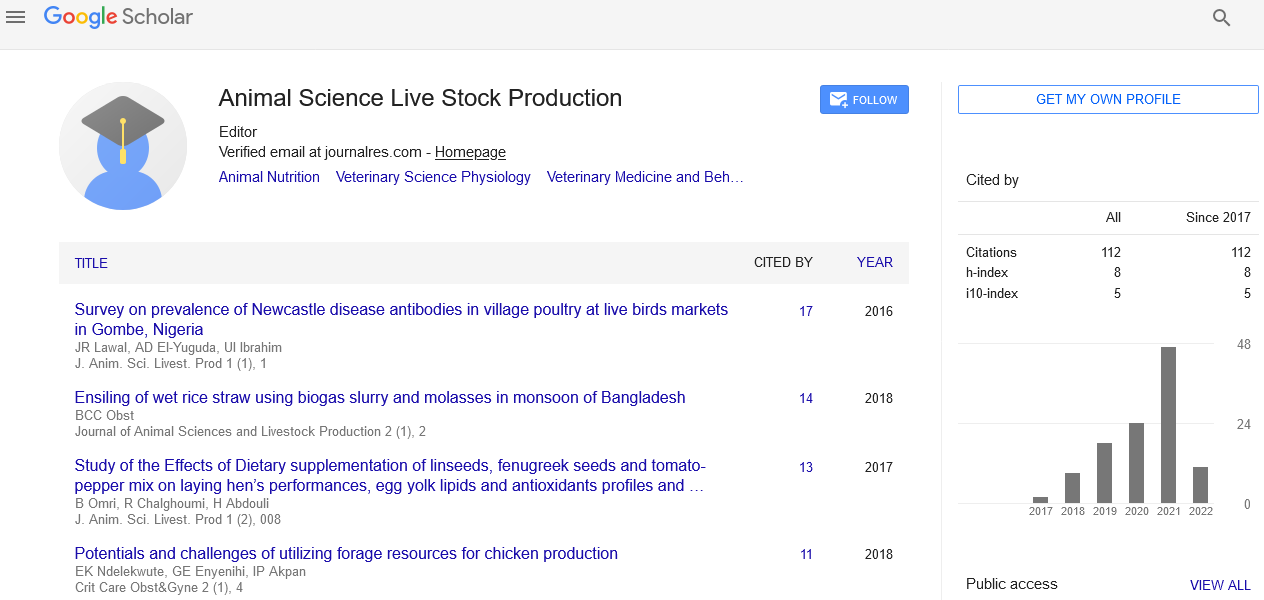Commentary - (2024) Volume 8, Issue 4
The Importance of Veterinary Medicine: Caring for Animal Health
Kai Matsuda*
Department of Animal Sciences, Tohoku University, Japan
*Correspondence:
Kai Matsuda,
Department of Animal Sciences, Tohoku University,
Japan,
Email:
Received: 02-Dec-2024, Manuscript No. IPJASLP-24-22163;
Editor assigned: 04-Dec-2024, Pre QC No. IPJASLP-24-22163 (PQ);
Reviewed: 18-Dec-2024, QC No. IPJASLP-24-22163;
Revised: 23-Dec-2024, Manuscript No. IPJASLP-24-22163 (R);
Published:
30-Dec-2024, DOI: 10.36648/2577-0594.8.4.33
Description
Veterinary medicine is a specialized field of healthcare focused
on the diagnosis, treatment, and prevention of diseases
in animals. It plays a crucial role not only in the well-being
of pets and livestock but also in protecting public health
and the environment. Veterinarians, the professionals who
practice veterinary medicine, work across various domains,
from treating household pets to safeguarding food security
through livestock management. This article delves into the
importance of veterinary medicine, its different branches,
and its impact on society. Veterinarians are highly trained
professionals responsible for diagnosing and treating diseases,
injuries, and disorders in animals. They work in a variety of
settings, including private practices, animal hospitals, farms,
research facilities, and public health organizations. While many
veterinarians specialize in caring for pets such as dogs, cats, and
birds, others focus on livestock, wildlife, or even exotic animals.
In addition to medical treatment, veterinarians are responsible
for animal welfare, advising pet owners and farm operators
on preventive care, vaccinations, and nutrition. They may also
perform surgeries, administer medications, and manage pain
relief. Preventative care is particularly important in maintaining
the health of animals and preventing the spread of infectious
diseases, which could potentially affect humans or other
animals. Veterinary medicine is a diverse field with several
sub-specialties. This is the most common field of veterinary
medicine, focusing on pets such as dogs, cats, and rabbits. Large
animal veterinarians play a crucial role in food security, ensuring
the health and productivity of livestock. Exotic veterinarians
care for non-traditional pets such as reptiles, birds, and small
mammals. These animals require specialized care due to their
unique health needs, making this a highly specialized area of
veterinary practice. Pathologists in the veterinary field focus
on diagnosing diseases in animals through the study of tissue
samples, blood work, and post-mortem examinations. Their
findings can help identify new diseases, improve diagnostic
techniques, and understand the causes of death in animals.
This area focuses on the relationship between animal health
and public health. Veterinarians in this field work to prevent
the transmission of zoonotic diseases. Veterinary medicine
has a direct impact on human health, especially in terms of
zoonotic disease prevention. Many diseases that originate in
animals can be transmitted to humans, either through direct
contact with infected animals or through contaminated food
products. For instance, diseases like tuberculosis, anthrax,
and certain types of influenza have crossed from animals to
humans. Veterinarians are at the forefront of preventing these
diseases by conducting surveillance, managing outbreaks, and
ensuring that food products from animals, such as meat and
milk, are safe for human consumption. They also work with
public health officials to monitor and control the spread of
diseases that could pose a threat to both animals and humans.
Becoming a veterinarian requires years of education and
rigorous training. Empathy and patience are also essential, as
veterinarians frequently work with animals that may be in pain
or distress. As the world continues to evolve, so too does the
field of veterinary medicine. In the future, veterinarians may
increasingly focus on preventive medicine and the promotion
of overall animal well-being. Veterinarians play a critical role in
safeguarding animal health, ensuring food security, preventing
disease transmission, and contributing to overall public
health. As the field continues to advance, it will remain a vital
component of modern society, promoting a healthier, safer
world for all living beings.
Acknowledgement
None.
Conflict Of Interest
None.
Citation: Matsuda K (2024) The Importance of Veterinary Medicine: Caring for Animal Health. J Animal Sci. 8:33.
Copyright: © 2024 Matsuda K. This is an open-access article distributed under the terms of the Creative Commons Attribution License, which permits unrestricted use, distribution, and reproduction in any medium, provided the original author and source are credited.

